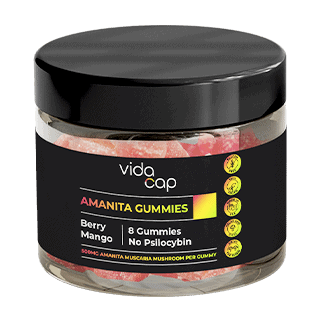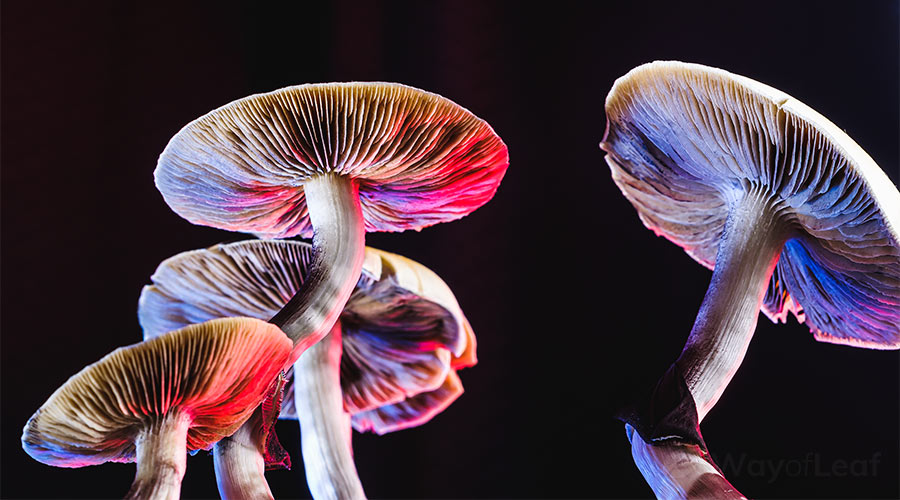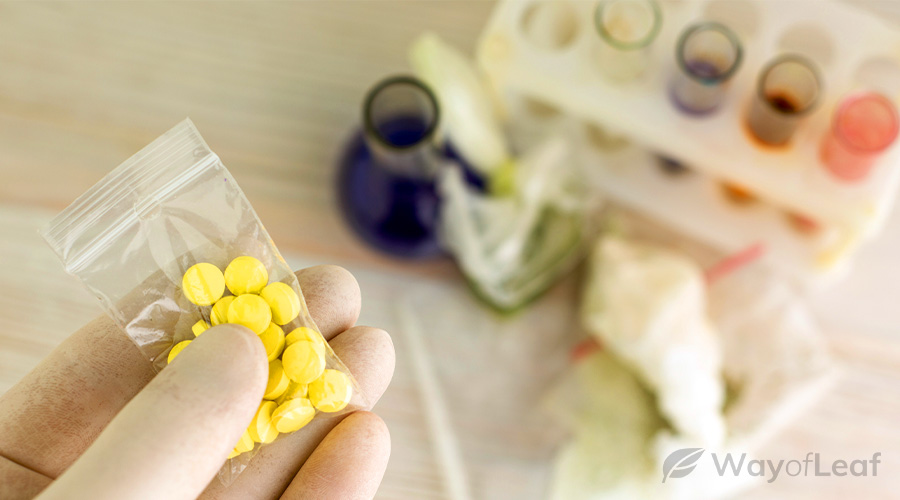Also called empathogens, entheogens, and hallucinogens, psychedelics are psychoactive substances. They can produce changes in a person’s conscious experience, including alterations in feelings, emotions, cognition, and perception. The best-known psychedelics include:
- Lysergic acid diethylamide (LSD)
- N, N-dimethyltryptamine (DMT)
- Mescaline
- Psilocybin
However, psychedelics are illegal in many countries around the world. Yet this is only a relatively recent event. In this article, we answer the question: “Why are psychedelics illegal?”

Want to experience the ‘magic’ of the Amanita muscaria mushroom? Iconic U.S. brand VidaCap has just launched a new range of 500mg Amanita gummies that soothe the mind and harmonize both body and spirit. Try them today and get 25% OFF all orders with WayofLeaf’s exclusive coupon code: AMANITAWOL
Why Are Psychedelics Illegal in the U.S.?
In Peru, the psychedelic brew called ayahuasca is legal to use and possess. In the Netherlands, adults can buy and use psilocybin in the form of truffles. Overall, there are a handful of countries that permit the usage of certain psychedelics.
This isn’t the case in the US, barring a small number of exceptions. One of the most noteworthy exceptions involves Members of the Native American Church. These individuals are legally permitted to consume peyote anywhere on the reservation. However, certain states, including Colorado, Nevada, and New Mexico, don’t recognize this law.

So, why are psychedelic drugs illegal in the United States? It is ostensibly due to the perception that these substances cause harm.
Classical psychedelics like LSD and psilocybin work by acting on neural circuits in the brain involved with the neurotransmitter serotonin. Some of their most noticeable effects take place in the brain’s prefrontal cortex. This is the part of the brain involved in perception, cognition, and mood.
The duration of the effects varies according to the drug used. For example, DMT’s effects tend to last between 20 and 45 minutes. Drinking ayahuasca could lead to effects that last up to four hours. Psilocybin’s effects could last for up to eight hours.
What Are the Reported Side Effects?
The effects vary depending on the psychedelic. However, they may include short-term issues such as:
- Profound sweating
- Panic, paranoia, or nervousness
- Sleeplessness and dizziness
- Increased heart rate
Two of the more disturbing long-term effects often associated with hallucinogens are:
- Persistent Psychosis: This is a series of ongoing mental issues. It can include symptoms such as mood changes, paranoia, and visual disturbances.
- Hallucinogen Persisting Perception Disorder (HPPD): This can result in flashbacks where the user has recurrences of specific drug experiences. These episodes happen without warning. They can begin within days of using the drug or up to a year afterward. Occasionally, HPPD is mistaken for disorders such as a brain tumor or stroke.
The Trouble with Analyzing the Risks of Psychedelics
Relatively little was known about psychedelics until the early 1900s in the West, though indigenous communities have used certain psychedelics for thousands of years. LSD didn’t exist until it was synthesized in a lab in 1938. Even then, researchers weren’t aware of its psychedelic effects for another five years.
The first wave of experimentation and research didn’t begin until the 1950s. A proportion of today’s studies draw on data from this era.
However, the old studies had a variety of issues with their methodology. Some lacked baseline data about subjects, while others failed to use placebos.
A study published in PLoS One in 2013 analyzed the potential link between psychedelics and mental health. It used data drawn from the National Survey on Drug Use between 2001 and 2004. Over 130,000 people responded to these surveys. The researchers found that almost 22,000 respondents (13.4%) reported lifetime psychedelic use.
The study outlined no significant associations between lifetime usage of any psychedelic and increased rate of mental health problems. In some instances, the use of a psychedelic was linked with a lower rate.
Johns Hopkins Researchers Call for a Change in Schedule for Psychedelics
Research at John Hopkins University, published in Neuropharmacology in 2018, weighed heavily in favor of psychedelic use. It was part of a review that assessed medically administered psilocybin. The study concluded that psilocybin could “provide therapeutic benefits that may support the development of an approvable New Drug Application (NDA).”
According to the researchers:
- Humankind has used psilocybin mushrooms for millennia.
- Human and animal studies show evidence of no physical dependence potential and low abuse.
- Extensive national surveys show low levels of abuse, harm, and treatment-seeking among those using psilocybin.
Overall, the team suggested that psilocybin warrants Schedule IV status. This is a classification similar to many prescription drugs.
The Real Reason Why Psychedelics Are Illegal
The weight of evidence is beginning to show certain drugs in a better light in recent times. Therefore, why are psychedelics illegal? A study published in the CBHSQ Report in 2013 looked at the highlights of the 2011 Drug Abuse Warning Network findings on drug-related ER visits.
It highlighted the meager number of hospital visits linked to psychedelics compared to other drugs. In 2011, LSD and psilocybin accounted for just 0.005% of emergency room visits in the United States.

With such data to hand, one must question the notion that psychedelics are banned for public health reasons. After all, the opioid epidemic is claiming tens of thousands of lives annually. However, these drugs remain widely available with a doctor’s prescription.
There are a few potential reasons why governments are against the use of psychedelics. Please note that the following are theories and should not be taken as fact.
Money
Marijuana is becoming legal in certain American states because it is possible to tax it. California became the first state to legalize MMJ in 1996. The Golden State now permits the use of recreational marijuana. California hopes to earn over $1 billion per annum in tax revenue within the next few years.
Yes, it is possible to tax LSD, for example. However, cynics point out that it is impossible to tax something found in a field, such as psilocybin mushrooms. Therefore, one possible reason why psychedelics are illegal is due to a lack of taxation.
One way around this is for pharmaceutical companies to create a synthetic version of psilocybin. The research by Johns Hopkins already leaves the door open for this to happen sooner rather than later.
Free Thinking
It is said that a government’s ideal populous is one that readily absorbs everything spoon-fed to it. The suggestion is that critical thinking is not permitted. Many advocates of psychedelic drugs said they inhibit hippocampal censorship mechanisms. As a result, users of these drugs see things the way they really are.
Richard Nixon
There is perhaps merit to this particular suggestion. Though psilocybin received its ban during the tenure of Lyndon B. Johnson, Nixon began a war on drugs in the early 1970s. The Vietnam War had become extremely unpopular in the United States by this period. The number of open protests escalated dramatically.
Those involved in the most frequent and noticeable protests were individuals who were part of the hippy movement.
They regularly used psychedelics and marijuana. Nixon decided to demonize their lifestyle and began calling them enemies of the state. Soon enough, law enforcement started cracking down and arresting them.
Meanwhile, there were rumors of the military conducting studies on the effects of potent psychedelics. According to the story, they dosed soldiers with LSD secretly. However, the military found that LSD made the soldiers pacifists. This theory is another version of the “curtailment of free-thinking” notion.
Ultimately, these theories and many others are based on perhaps some facts, but also a lot of supposition.
When Were Psychedelics Made Illegal?
In 1960, Timothy Leary was involved in the infamous Psilocybin Project at Harvard. With the help of Dr. Richard Alpert, he studied various applications of so-called magic mushrooms. One experiment found that psilocybin reduced recidivism rates amongst prisoners.
However, other faculty members took exception to the research, and Harvard stopped it in 1963. A slew of academics openly criticized Leary and Alpert, saying the studies were dangerous. The government noted this disapproval, and officially banned psilocybin in the United States in 1968.
During the presidency of Nixon, the government introduced the Controlled Substances Act in 1970. It was a policy that made psychedelics illegal. Mescaline, LSD, psilocybin, and marijuana became Schedule I drugs, the strictest classification. By 1977, all research into psilocybin on humans had ended in America[2].
Are All Psychedelic Drugs Illegal?
The answer is no, but it depends on the jurisdiction. The United Nations adopted the Convention of Psychotropic Substances in 1971. It made the sale, possession, use, and distribution of many drugs, including psychedelics, illegal worldwide. The only exception involved scientific research into the drugs.
A few countries have softened their stance on psychedelics. However, it is still challenging to find psychedelic mushrooms that are not illegal. The possession and sale of psilocybin mushrooms are legal in:
- Bahamas
- Brazil
- Jamaica
- Samoa
Interestingly, psilocybin mushrooms have never been illegal in Jamaica. Several South American countries also allow the use of ayahuasca. In Portugal, LSD is widely available since the nation decriminalized the possession of small amounts of most drugs in 2001.
As for the United States, ketamine-assisted psychedelic psychotherapy is available under certain circumstances. Possession of psilocybin-containing mushrooms remains illegal. However, the spores don’t contain intoxicating chemicals. As a result, it isn’t against the law to sell spores in many states. Nonetheless, the sale of spores to produce hallucinogenic mushrooms is illegal.
Final Thoughts on the Legality of Psychedelics
In general, the sale and possession of psychedelics such as LSD and psilocybin are illegal in the United States. These drugs are also prohibited in a significant majority of countries. Up until recently, anti-psychedelics laws passed due to a reliance on old data. It is only recently that researchers have used modern techniques to perform detailed studies.
They are starting to discover that old information on psychedelics is outdated. Nonetheless, it seems likely that the U.S. Government will approve synthetic versions of psychedelics rather than allow people to consume them as nature intended.

Want to experience the ‘magic’ of the Amanita muscaria mushroom? Iconic U.S. brand VidaCap has just launched a new range of 500mg Amanita gummies that soothe the mind and harmonize both body and spirit. Try them today and get 25% OFF all orders with WayofLeaf’s exclusive coupon code: AMANITAWOL











![What Is a Bad Trip? [Fully Explained]](https://wayofleaf.com/wp-content/uploads/2020/12/wol-banner-what-is-a-bad-trip-640x225.jpg)
![Is Ayahuasca Legal in the US? [What the Laws Say]](https://wayofleaf.com/wp-content/uploads/2020/11/wol_banner_is_ayahuasca_legal_in_the_united_states-640x225.jpg)
![Preparing for a First Psychedelic Trip [All You Need to Know]](https://wayofleaf.com/wp-content/uploads/2020/09/wol_how-to-prepare-for-your-first-psychedelic-mushroom-trip-640x225.jpg)
